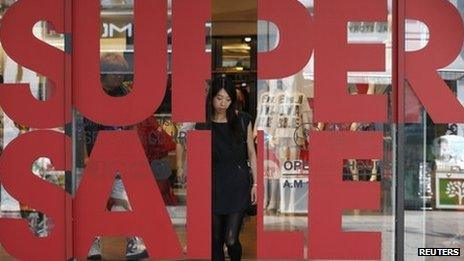South Korea's growing credit problem
- Published

South Korea's credit culture spreads far beyond its poorest citizens
South Koreans are spending more than they earn. After decades of strong economic growth, a nation of careful savers has given birth to a credit culture that has been labelled a "ticking time bomb".
Park Jong-hyun has put on a jacket for his visit to Korea's National Happiness Fund. The thin, shiny material catches the strip lights as he and his wife wait their turn at the counter.
About 150,000 people like him have applied to the fund since it opened five months ago - a new government initiative designed to help the poorest Koreans manage their debt.
"I used to have 10 credit cards," Mr Park said. "I had to use them for a variety of things: day-to-day stuff at home, office supplies for work, and then there are those big purchases for thousands of dollars, like a refrigerator or home appliances."
The debt managers agree to write off 50% of Mr Park's debt: he leaves a happy man.
But not everyone agrees this kind of "debt amnesty" is the answer. It's been designed as a one-time solution for those on the lowest incomes and is scheduled to run only for five years, but critics say it will encourage people to default.
The scheme's general manager, Kwon Young-dae, points to the strict criteria for applications and to the profile of those applying: the average debt of applicants is just over $10,000 (£6,300) he says, and their average income is less than half that.
"This isn't about funding lavish lifestyles," he added.
The National Happiness Fund was a key campaign pledge of the current South Korean president, Park Geun-hye, who has vowed to tackle growing inequality in the country.
It's the most dramatic side of the country's debt problem, but South Korea's credit culture spreads far beyond its poorest citizens.
The pressure to spend money on brand names and high-end consumer goods has spiralled since the Asian Financial Crisis in the late 1990s, even as the economy has slowed.
Steep investment
The newly-married Mr Kim said weddings are more commercialised
Kim Dae-soon has just gotten married, so he knows all about spending money. Korean weddings are ringed with traditional customs, many of which have acquired a new, modern price-tag.
Expected gifts include new suits for all the bride's male in-laws and expensive jewellery, accessories and make-up for her - in addition to the usual costs of ceremony, reception and honeymoon.
"Some things about getting married are very stressful here because there are certain standards that need to be met - traditional standards and modern standards," Mr Kim said.
"Traditional marriage is about the concept of 'hyo', or respect, and deference to one's parents, but the modern marriage is all about spending money, it's become very commercialised."
Mr Kim's parents got married in their village, with the help of their neighbours.
His wedding and modest rental apartment cost $300,000 - mostly because Korea's unique system of rental deposits means that anyone trying to set up home faces a steep investment.
And recent research has found that even in the past three years, the cost of getting married in South Korea has grown by 30%.
'Risk factor'
Savings has been shrinking and credit spiralling in South Korea
Until recently, the cost of weddings, education and apartments came from years of careful savings by parents or grandparents. Research by Dr Jongsung Kim at the Korea Economic Institute found that household savings had declined from 20% in the mid-1990s, to around 3% now.
Instead, the Bank of Korea reported recently that South Koreans became the world's top credit card users in 2011.
And household debt as a whole rose to 164% of disposable income at the end of last year - more than in the US - making this South Korea's "most significant potential risk factor", according to Dr Kim.
The irony is the government actually wants people to spend more. The country's economic model, based on big manufacturing companies, is showing signs of slowing and South Korea needs to boost domestic spending as a way to balance it.
Kim Dae-soon and his wife end their wedding ceremony with a traditional bow to their parents. In return, they receive pocket money to spend on their honeymoon.
Until now, young people have relied on their parents and grandparents to start them off in life. But with savings shrinking, and credit spiralling, the question is: who will pay the bill when it is their children's turn?
- Published24 February 2013
- Published25 July 2013